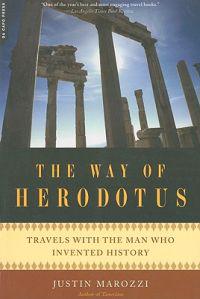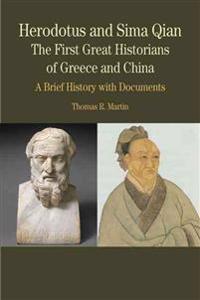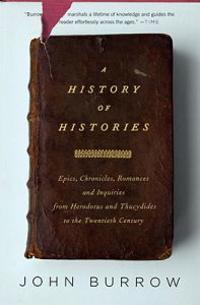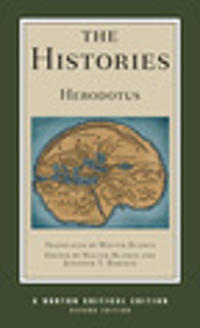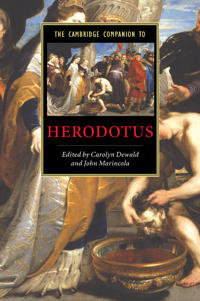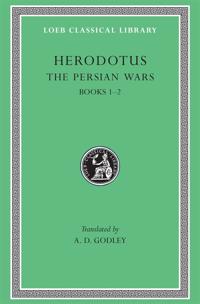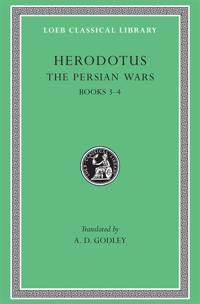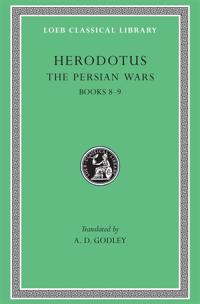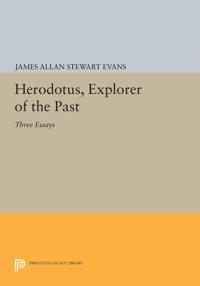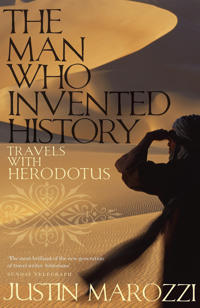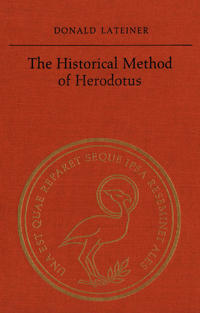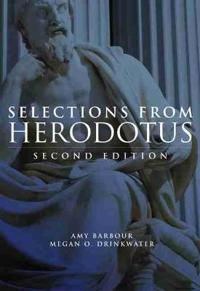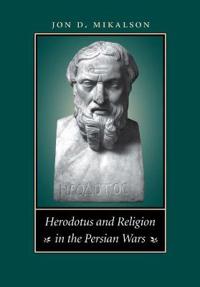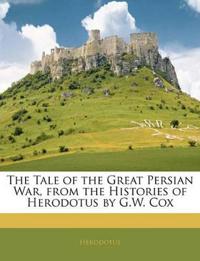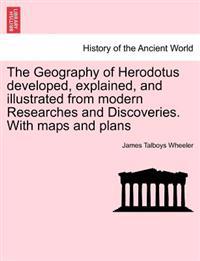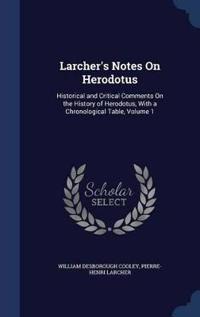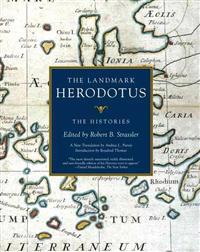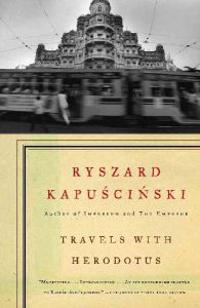The Way of Herodotus (Pocket)
avJustin Marozzi
ISBN: 9780306818578 - UTGIVEN: 2010-02Intrepid travel historian Justin Marozzi retraces the footsteps of Herodotus through the Mediterranean and Middle East, examining Herodotus's 2,500-year-old observations about the cultures and places he visited and finding echoes of his legacy reverberating to this day. The Way of Herodotus is a liv[...]
Herodotus and Sima Qian: the First Great Historians of Greece and China (Häftad)
avThomas R. Martin
ISBN: 9780312416492 - UTGIVEN: 200910In this accessible volume, Thomas R. Martin compares the writings of Herodotus in ancient Greece with those of Sima Qian in ancient China to demonstrate the hallmarks of early history writing. While these authors lived in different centuries and were not aware of each other's works, Martin shows the[...]
A History of Histories: Epics, Chronicles, Romances and Inquiries from Herodotus and Thucydides to the Twentieth Century (Häftad)
avJohn Burrow
ISBN: 9780375727672 - UTGIVEN: 200904The Histories (Häftad)
avHerodotus
ISBN: 9780393933970 - UTGIVEN: 2013-05Walter Blanco's acclaimed translation of The Histories is now available in its entirety in this revised and expanded Norton Critical Edition. Herodotus's history is the earliest continuous prose narrative in Western literature. His long narrative - longer than either of the Homeric epics - continues[...]
The Mirror of Herodotus (Häftad)
avFrancois Hartog
ISBN: 9780520264236 - UTGIVEN: 2009-07Herodotus' great work is not only an account of the momentous historical conflict between the Greeks and the Persians but also the earliest sustained exploration in the West of the problem of cultural difference. Francois Hartog asks fundamental questions about how Herodotus represented this differe[...]
The Cambridge Companion To Herodotus (Pocket)
avCarolyn Dewald, John Marincola, Carolyn Dewald
ISBN: 9780521536837 - UTGIVEN: 200606Herodotus' Histories is the first major surviving prose work from antiquity. Its range of interests is immense, covering the whole of the known world and much beyond, and it culminates in a detailed account of the Persian Wars of the early fifth century BC. Moreover, research has shown that Herodotu[...]
The Histories (Inbunden)
avHerodotus, Paul Cartledge
ISBN: 9780670024896 - UTGIVEN: 2014-05One of Western history's greatest books springs to life in Tom Holland's vibrant new translation
Herodotus of Halicarnassus--who was hailed by Cicero as "the father of history"--wrote his histories around 440 BC. It is the earliest surviving work of nonfiction and a thrilling narrative account [...]Histories (Inbunden)
avHerodotus
ISBN: 9780674991309 - UTGIVEN: 198612Herodotus the great Greek historian was born about 484 BCE, at Halicarnassus in Caria, Asia Minor, when it was subject to the Persians. He travelled widely in most of Asia Minor, Egypt (as far as Assuan), North Africa, Syria, the country north of the Black Sea, and many parts of the Aegean Sea and t[...]
Herodotus/Books Iii-IV
ISBN: 9780674991316 - UTGIVEN: 1921-06Herodotus the great Greek historian was born about 484 BCE, at Halicarnassus in Caria, Asia Minor, when it was subject to the Persians. He travelled widely in most of Asia Minor, Egypt (as far as Assuan), North Africa, Syria, the country north of the Black Sea, and many parts of the Aegean Sea and t[...]
Herodotus (Inbunden)
avA. D. Godley
ISBN: 9780674991330 - UTGIVEN: 1922-06Herodotus the great Greek historian was born about 484 BCE, at Halicarnassus in Caria, Asia Minor, when it was subject to the Persians. He travelled widely in most of Asia Minor, Egypt (as far as Assuan), North Africa, Syria, the country north of the Black Sea, and many parts of the Aegean Sea and t[...]
Histories (Inbunden)
avHerodotus
ISBN: 9780674991347 - UTGIVEN: 192512Herodotus the great Greek historian was born about 484 BCE, at Halicarnassus in Caria, Asia Minor, when it was subject to the Persians. He travelled widely in most of Asia Minor, Egypt (as far as Assuan), North Africa, Syria, the country north of the Black Sea, and many parts of the Aegean Sea and t[...]
Herodotus, Explorer of the Past
ISBN: 9780691634753 - UTGIVEN: 2016-04Why does a power expand and become an empire? Writing in the early years of the Peloponnesian War, Herodotus gave Athens full credit for saving Greece from Persia, but also identified the city's expansion as a new manifestation of imperialist aggression. In this skillful analysis of Herodotus' intel[...]
Man who invented history - travels with herodotus
ISBN: 9780719567131 - UTGIVEN: 2009-08Herodotus is known as the Father of History, but he was much more than that. He was also the world's first travel writer, a pioneering geographer, anthropologist, explorer, moralist, tireless investigative reporter and enlightened multiculturalist before the word existed. He was at once learned prof[...]
The Historical Method of Herodotus (Pocket)
avDonald Lateiner
ISBN: 9780802076847 - UTGIVEN: 1992-01Herodotus was the first writer in the West to conceive the value of creating a record of the recent past. He found a way to co-ordinate the often conflicting data of history, ethnology, and culture. The Historical Method of Herodotus explores the intellectual habits and the literary principles of th[...]
Selections from Herodotus (Pocket)
avAmy L. Barbour, Megan O. Drinkwater, Amy L. Barbour
ISBN: 9780806141701 - UTGIVEN: 2011-01The writings of Herodotus, historian, observer, and delightful storyteller, have long been favorites among teachers and students of the Greek language. The selections in this book will provide reading in the second year for the student who has begun his or her Greek with Homer and who presumably has[...]
Herodotus and Religion in the Persian Wars
ISBN: 9780807872888 - UTGIVEN: 2003-09The two great Persian invasions of Greece, in 490 and 480-79 B.C., both repulsed by the Greeks, provide our best opportunity for understanding the interplay of religion and history in ancient Greece. Using the Histories of Herodotus as well as other historical and archaeological sources, Jon Mikalso[...]
Herodotus
ISBN: 9781107029347 - UTGIVEN: 2018-02Book VI of the Histories is one of Herodotus' most varied books, beginning with the final collapse of the Ionian Revolt and moving on to the Athenian triumph at Marathon (490 BC); it also includes fascinating material on Sparta, full of court intrigue and culminating in Kleomenes' grisly death, and [...]
The Tale of the Great Persian War, from the Histories of Herodotus by G.W. Cox (häftad)
ISBN: 9781144638236 - UTGIVEN: 2010-02The Geography of Herodotus Developed, Explained, and Illustrated from Modern Researches and Discoveries. with Maps and Plans (Häftad)
avJames Talboys Wheeler
ISBN: 9781241444433 - UTGIVEN: 2011-03Title: The Geography of Herodotus developed, explained, and illustrated from modern Researches and Discoveries. With maps and plans.Publisher: British Library, Historical Print EditionsThe British Library is the national library of the United Kingdom. It is one of the world's largest research librar[...]
The Landmark Herodotus: The Histories (Häftad)
avRobert B. Strassler, Rosalind Thomas
ISBN: 9781400031146 - UTGIVEN: 200906From the editor of the widely praised "The Landmark Thucydides," a new Landmark Edition of "The Histories" by Herodotus.Cicero called Herodotus "the father of history," and his only work, "The Histories," is considered the first true piece of historical writing in Western literature. With lucid pros[...]
Reading Herodotus (Häftad)
ISBN: 9781421406565 - UTGIVEN: 2012-08Debra Hamel's book is a lively introduction to "The History of the Persian Wars", Herodotus' account of Persia's expansion under four kings-Cyrus, Cambyses, Darius, and Xerxes - and its eventual collision with the city - states of Greece. "The History" can be a long slog for modern readers, but it i[...]
Studyguide for on Politics: A History of Political Thought: From Herodotus to the Present by Ryan, Alan, ISBN 9780871404657 (Övrig)
avCram101 Textbook Reviews
ISBN: 9781478433118 - UTGIVEN: 2013-03-29

